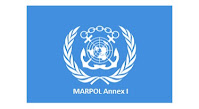Regulations for the Prevention of Pollution by Oil
- It entered into force on 2 October 1983.
- It covers the prevention of pollution from Oil from operational measures as well as from accidental discharges.
- The 1992 amendments to Annex I made it mandatory for new oil tankers to have Double Hulls and brought in a phase-in schedule for existing tankers to fit double hulls, which was subsequently revised in 2001 and 2003.
Regulation 2 - Application
Regulation 4 - Exceptions
Regulation 5 - Equivalents
Chapter 2 - Surveys and Certification (Harmonised Requirements)
Regulation 6 - Surveys (Harmonised Requirements)
Regulation 7 - Issue or Endorsement of the certificate (Harmonised Requirements)
Regulation 8 - Issue or Endorsement of the certificate by another government (Harmonised Requirements)
Regulation 9 - Form of the certificate (Harmonised Requirements)
Regulation 10 - Duration and validity of the certificate (Harmonised Requirements)
Regulation 11 - Port state control on operational requirements (Harmonised Requirements)
Chapter 3 - Requirements for Machinery spaces of All Ships
Part A - Construction
Regulation 12 - Tanks for Oil Residue (Sludge) (click here to know more)
Regulation 12A - Oil fuel tank protection
Regulation 13 - Standard discharge connection (click here to know more)
Part B - Equipment
Regulation 14 - Oil filtering equipment (click here to know more)
Part C - Control of Operational Discharge of Oil
Regulation 15 - Control of discharge of oil (click here to know more)
Regulation 16 - Segregation of oil and water ballast and carriage of oil in forepeak tanks
Regulation 17 - Oil Record Book, Part I - Machinery space operations (click here to know more)
Chapter 4 - Requirements for the Cargo Area of Oil Tankers
Part A - Construction
Regulation 18 - Segregated ballast Tanks (click here to know more)
Regulation 19 - Double Hull and double bottom requirements for oil tankers delivered on or after 6 July 1996
Regulation 20 - Double Hull and double bottom requirements for oil tankers delivered before 6 July 1996
Regulation 21 - Prevention of oil pollution from oil tankers carrying heavy-grade oil as cargo
Regulation 22 - Pump-room bottom protection (click here to know more)
Regulation 23 - Accidental oil outflow performance
Regulation 24 - Damage assumptions
Regulation 25 -Hypothetical outflow of oil
Regulation 26 - Limitations of size and arrangement of cargo tanks
Regulation 27 - Intact Stability
Regulation 28 - Subdivision and damage stability
Regulation 29 - Slop Tanks (click here to know more)
Regulation 30 - Pumping, piping and discharge arrangement
Part B - Equipment
Regulation 31 - Oil Discharge Monitoring and Control system (click here to know more)
Regulation 32 - Oil/water interface detector (click here to know more)
Regulation 33 - Crude oil washing requirements (click here to know more)
Part C - Control of Operational Discharge of Oil
Regulation 34 - Control of discharge of oil (click here to know more)
Regulation 35 - Crude oil washing requirements (Click here to know more)
Regulation 36 - Oil Record Book, Part II - Cargo/ballast Operations (click here to know more)
Chapter 5 - Prevention of Pollution Arising from an Oil Pollution Incident
Regulation 37 - Shipboard oil pollution emergency plan (click here to know more)
Chapter 6 - Reception Facilities
Regulation 38 - Reception Facilities (click here to know more)
Chapter 7 - Special Requirements for Fixed or Floating Platform
Regulation 39 - Special Requirements for Fixed or Floating Platform (click here to know more)
Chapter 8 - Prevention of Pollution During Transfer of Oil Cargo Between Oil Tankers at Sea
Regulation 40 - Scope of application (click here to know more)
Regulation 41 - General Rules on safety and environmental protection (click here to know more)
Regulation 42 - Notification (click here to know more)
Chapter 9 - Special Requirements for the use or Carriage of Oils in the Antarctic Area
Regulation 43 - Special Requirements for the use or Carriage of Oils in the Antarctic Area
Regulation 43A - Special Requirements for the use and carriage of oils as fuel in Arctic waters
Chapter 10 - Verification of Compliance with the provisions of this Convention
Regulation 44 - Application
Regulation 45 - Verification of Compliance
Chapter 11 - International Code for Ships Operating in Polar Waters
Regulation 46 - Definitions
Regulation 47 - Application and requirements
Reference: IMO Publications & Documents - International Conventions - MARPOL









0 Comments
Thanks for your Valuable comments and Suggestions